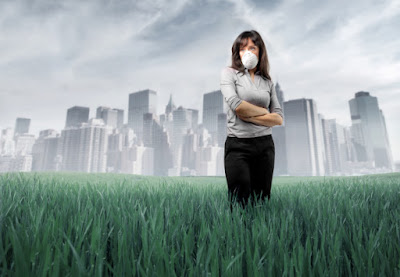Air pollution is becoming a major health problem that
affects millions of people world-wide. Air Pollution is an undesirable change
in the physical, chemical or biological characteristics of air. Air pollution mainly
affects respiratory system causing breathing difficulties and lung diseases
such as bronchitis, asthma, pneumonia and lung cancer. As air pollution levels
rise, people with lung conditions are at higher risk of becoming ill and
needing treatment. If you have a lung condition, high levels of pollution can
also cause an exacerbation of your symptoms, such as an asthma attack or a COPD
flare-up. Here are some simple, effective tips for protecting you and your family from the dangers of air pollution-
- Avoid morning walks, garden exercises and outdoor activities when pollution levels are high. Keep doing your exercise indoors in a well-ventilated room or gym.
- Limit the amount of time your child spends playing outdoors if the air quality is unhealthy.
- Use of anti-pollution masks can protect you from outdoor air pollution to some extent
- Stay away from heavy polluted area like main roads and crowded or high traffic area.
- Keep humidity levels under 50 percent. Use a dehumidifier or air conditioner, as needed.
- Use indoor Air Purifying plants like Spider Plants, Snake Plants, Aloe Vera, Elephant Ears, Bamboo Palms, Rubber Plants etc.
- Use Home air purifiers with HEPA filters
- Make sure proper ventilation in your kitchen and bathroom. While outdoor air pollution is a concern, indoor air pollution can be harmful.
- Avoid traveling in an open vehicle or with your car windows down.
- Consume foods with more vitamin C, omega 3 fatty acid, and magnesium.
- Jaggery (Gudd) can flush out pollutants from lungs. It can be consumed after meals or can be used as a replacement for sugar.
If you find your condition is getting worse, or if you’re getting wheezy or coughing from walking outside, get in touch with your doctor. Everyone should try to reduce their contribution to air pollution.
Source: British Lung Foundation & American Lung Association



Comments
Post a Comment